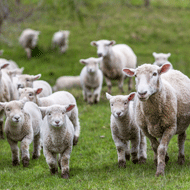
Online map shows rising risk levels after temperature fluctuations
Young lambs are now at ‘high’ or ‘very high’ risk of nematodirus in many parts of the UK, the latest forecast suggests.
Warm weather in February put early-born lambs at risk, meaning many farmers had to treat earlier than normal, according to SCOPS (Sustainable Control of Parasites). Risk levels rose again after a cold start to April.
In cooler regions of the UK, temperatures are yet to reach the threshold, so SCOPS is advising farmers in these areas to watch the forecast carefully.
A new feature on the online map shows when each location has changed from one risk level to another. It suggests that many areas across the UK have risen to ‘very high’ risk in the past seven to 14 days.
Kerry Sykes-Marsden, a shepherd with 900 ewes in Lincolnshire, commented: “Based on the advice on the website we’ve treated lambs earlier this year and this has avoided the ‘wait and see’ approach when we haven’t acted in the past to see clinical signs.
"Some years we have just gone in and wormed at six weeks of age, which could be too early or, even worse, too late.”



 The veterinary mental health charity Vetlife is inviting the veterinary community to join it for a sponsored cold-water dip.
The veterinary mental health charity Vetlife is inviting the veterinary community to join it for a sponsored cold-water dip.